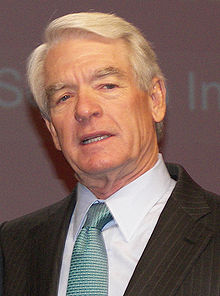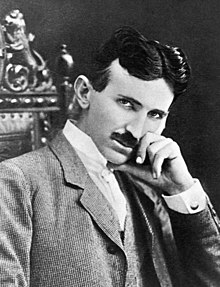History is full of innovators that have found success with learning differences like dyslexia or auditory processing disorder (APD). While many of them lived at times when these conditions were misunderstood, what has been recorded in history books can help us to draw reasonable conclusions.
From geniuses like Taussig to Tesla, the following individuals are solid testimony that there is nothing that can stop the human spirit!
Helen B. Taussig
|
|
Helen B. Taussig, the mother of pediatric cardiology, overcame many challenges in her life. As a child, she not only contracted tuberculosis but was also dyslexic. Despite all of this, Taussig did well academically due to extensive tutoring by her father, Frank Taussig, a Harvard professor. Because he saw potential in his daughter, Frank dedicated the time and energy necessary to help Helen become a proficient reader. This led her to study at various universities, finally obtaining her MD degree from John Hopkins University in 1927. The road was rough, but nothing was going to stop her! |
Octavia Spencer
|
|
Oscar-winning actress Octavia Spencer has been taking Hollywood by storm. What you might not be aware of is that she's also a children's book author. Why is the latter so noteworthy? Spencer is dyslexic. Spencer's driven personality has a lot to do with how she was raised to view her dyslexia. In one interview, she claimed that while she was growing up, she felt that “dyslexia gave (her) an edge.” Although she initially felt insecure about her reading abilities, she was encouraged by her mother and teachers to pay attention to the skills that she excelled in. In fact, she was even tested for her school's gifted program due to her auditory learning abilities. Spencer now says: “(Dyslexia) doesn't mean that you're not intelligent, it just means that your brain functions differently.” A true inspiration indeed. |
Cher
|
|
International pop star Cher is a household name for many. What people might not be aware of are the challenges she faced as a child in the 50s when dyslexia and dyscalculia had not yet been understood fully. Cher dropped out of high school in her junior year to pursue what she loved: entertainment. In her autobiography, entitled “The First Time,” Cher says “math was like trying to understand Sanskrit.” It wasn't until Cher had children of her own that she would be diagnosed with dyslexia and dyscalculia. On seeking professional help for her 10-year-old son, Chaz, the doctors informed her that such learning differences are often hereditary. In that very same appointment, both Chaz and Cher were diagnosed. Although her childhood wasn't ideal, Cher still excelled at her passions. Today, she focuses on her philanthropic work which involves assisting children through education. |
Charles Schwab
|
|
Another person who shares a similar story to Cher's is that of multimillionaire investor Charles Schwab. Schwab's own dyslexia was not diagnosed until he was 58 years old during the investigation of his son's learning difference. This made a lot of sense to Schwab as one of the main reasons he went into economics in college was because his academic struggle with reading and writing drove him to work on his strength: math. Schwab claims that his dyslexia caused his mind to strengthen other skills like visualization. Finally being able to put a label on his condition has allowed him to work along with his dyslexia, by using audiobooks instead of physical ones to learn more about his field. Schwab’s learning difference never stopped him from conquering the financial world! |
Anderson Cooper
|
|
Six-time Emmy-award-winning journalist Anderson Cooper came from a family of avid readers. He recounts that in his younger days, he would pretend to read books simply to keep up appearances in his household. The truth was that he struggled to make out certain letters and words. Teachers in his school soon picked up on his learning difference and gave him the tutoring and support he needed. Thanks to their help, Cooper would go on to pursue a career in journalism and graduate from Yale in political science. Cooper's life story is one of perseverance, and he always expresses his gratitude for his teachers' attention to his style of learning. Their concern made him the person he is today. |
Pablo Picasso
|
|
If anyone in the world is renowned for “making lemonade” out of dyslexia, it is one of the greatest artists who ever lived: Pablo Picasso. Picasso was seen as quite the troublemaker in his school days in Malaga, Spain. His difficulty with focusing often resulted in him being sent out of class. Interestingly though, he would use this time in exile to sharpen his artistic skills. He was later diagnosed with “Reading Blindness”—a 19th-century description of what we now know as dyslexia. What's fascinating, though, is how he responded to his diagnosis. Through coming to know his reading blindness, Picasso learned that things aren't always as they seem. This became a fundamental philosophy for the Avante-Garde art styles he is now so famous for. |
Nikola Tesla
|
|
Tesla is one of those figures that we know very little about when it comes to how his mind worked, but it is clear that he had many struggles. According to a source, Tesla struggled with OCD which would affect his work. Tesla shaped the very world we live in today, from the discovery of the electrical currents that power our homes to wireless technology. |
Don't Let Learning Differences Hold Your Child Back!
As we've seen from these examples, learning differences in no way makes a person less extraordinary than anyone else. In all of these life stories, we see a common thread: finding something you’re passionate about and having the freedom to explore it. The fact is, diagnosing and confronting learning differences as early as possible can save a person years of frustration and trauma.
About Eagle Hill School
Eagle Hill School is a private school for students with learning differences located in Greenwich, Connecticut. Their academic program is designed to help students struggling with learning differences like auditory processing disorder, dyscalculia, dyslexia, ADHD, executive functioning disorder, and dysgraphia. Specialized remedial learning programs are taught by experienced teachers who help students navigate through learning challenges, preparing them for bright futures ahead. Contact us to learn more.

.png)







